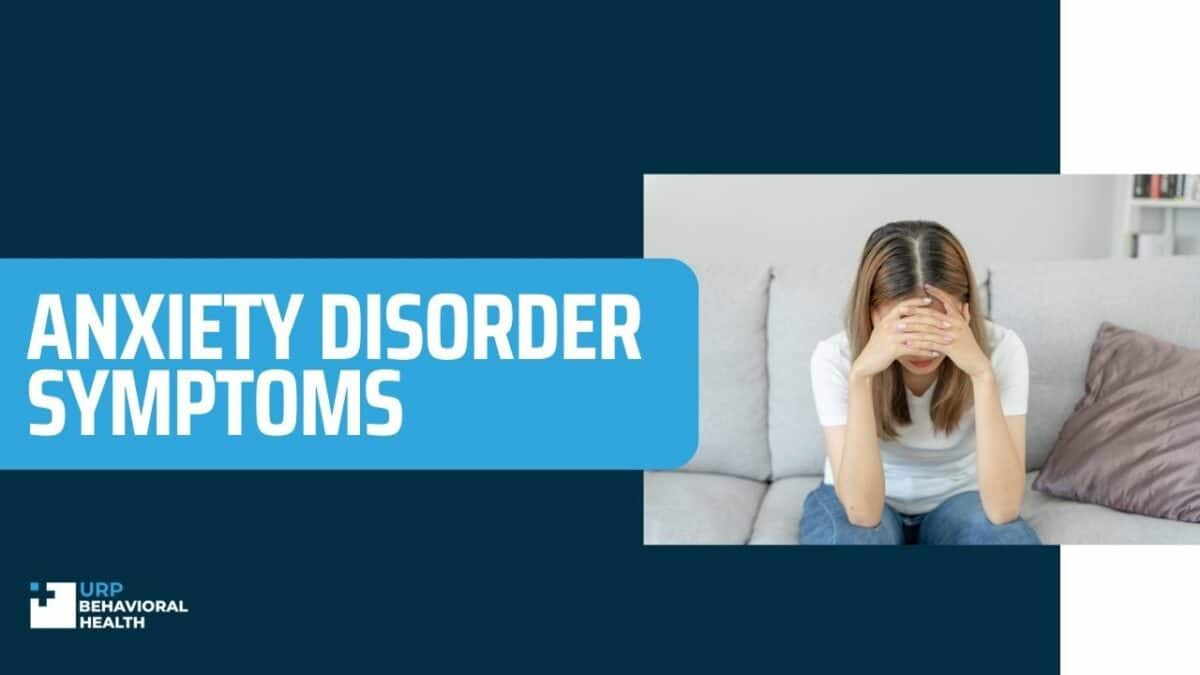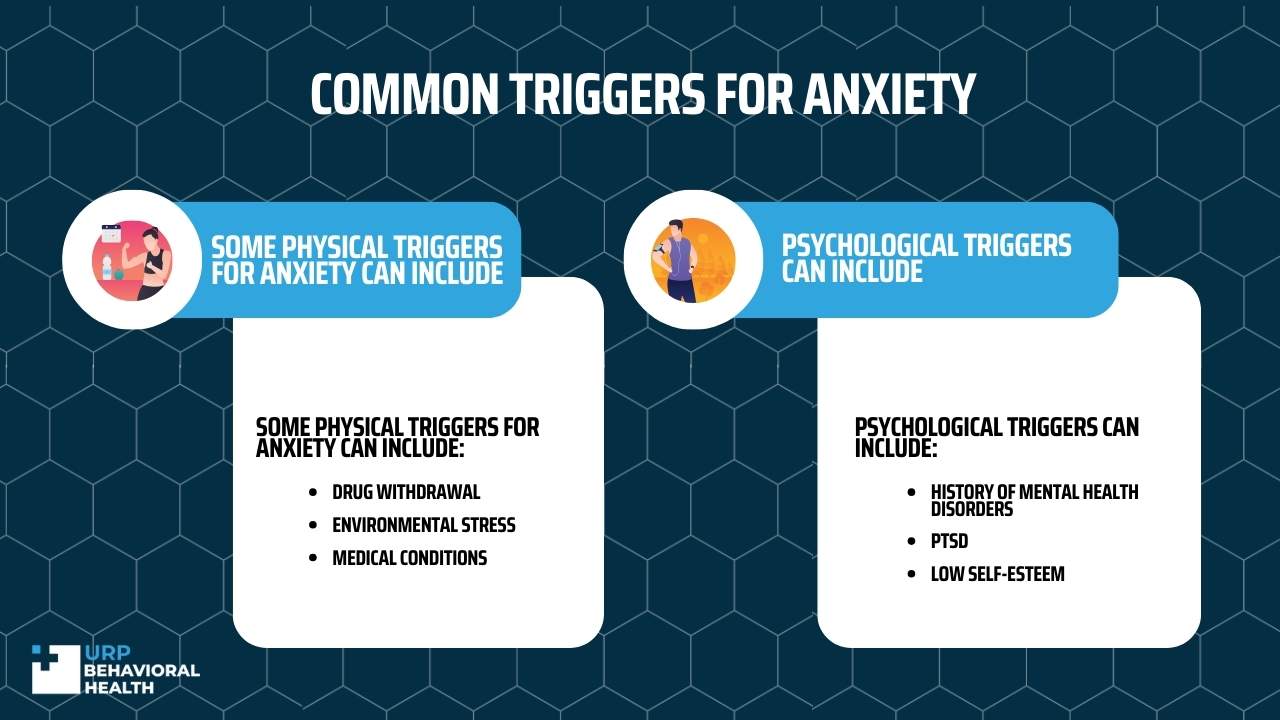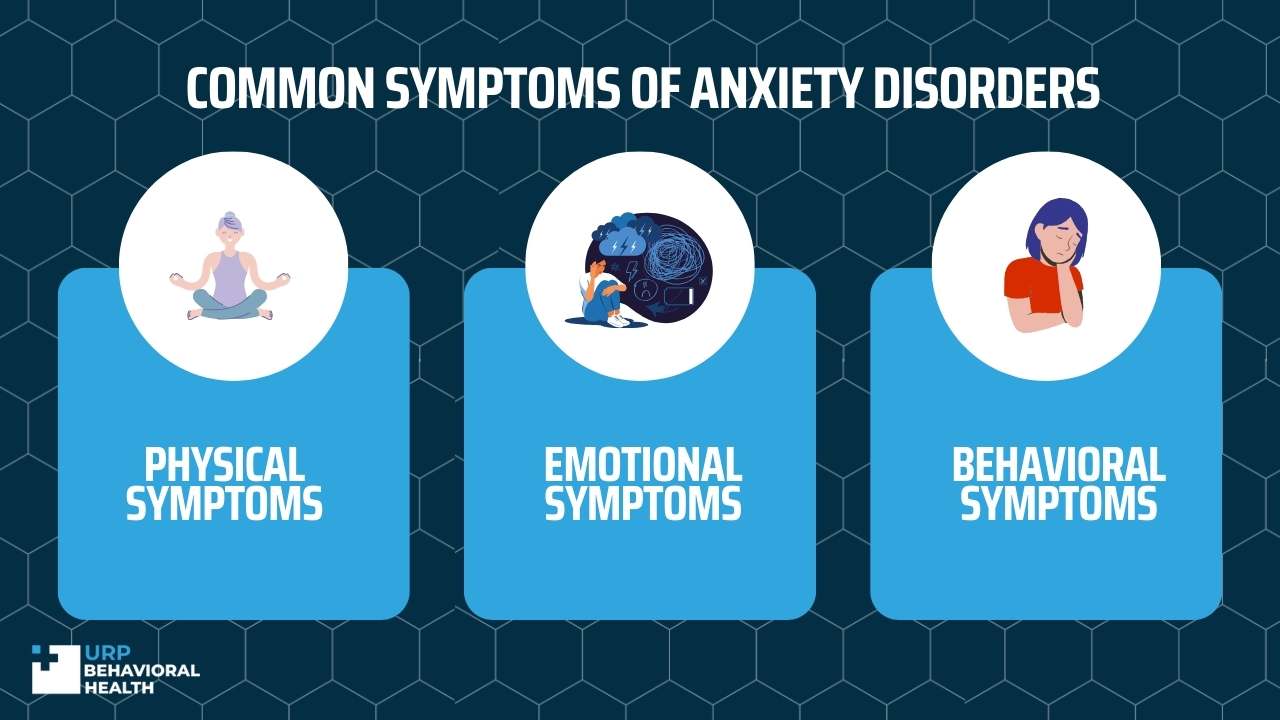Anxiety Disorder Symptoms

Introduction to Anxiety Disorders
Studies on a sample size of over 60,000 people show that 31.2% of the control population was struggling with some form of anxiety disorder. While anxiety can be a very normal reaction to stress in life and for your job, this is very different from anxiety disorder. The latter is a group of mental illnesses that result in overwhelming fear and stress caused by certain triggers.
How Normal Anxiety Differs From an Anxiety Disorder
Normal anxiety refers to the stress that people feel day-to-day. Whether it is from work, family, or a change in environment, you are likely to feel stressed during these situations. However, anxiety disorder, on the other hand, is an uncontrollable and intense type of fear that individuals feel frequently. Their anxiety could be the result of a specific triggering situation, but it could also be completely random.


Common Triggers for Anxiety
Some physical triggers for anxiety can include:
Drug withdrawal: People who are struggling with addictions will often struggle with an anxiety disorder due to withdrawal, and in some cases, it can be the result of consuming certain types of drugs.
Environmental stress: In some cases, anxiety can be the result of environmental stress, such as living with abusive partners or parents or financial struggles.
Medical conditions: Certain heart and lung conditions can lead to increased levels of anxiety or can exacerbate existing symptoms.
Psychological triggers can include:
History of Mental Health Disorders: Struggling with mental health disorders like depression can also contribute to increased levels of anxiety.
PTSD: struggling with PTSD can also lead to individuals developing an anxiety disorder.
Low Self-Esteem: Negative perceptions that a person has about their body and how they look can lead to social anxiety.
Types of Anxiety Disorders
Medication-induced anxiety disorder: A condition where using or withdrawing from certain types of illicit substances triggers symptoms of anxiety.
Selective Mutism: A unique type of social anxiety where children struggle to speak in public yet talk normally with their families.
Separation Anxiety: An immense sense of fear and anxiety overwhelms a person when someone close to them leaves their sight. While often common among children, this can also be prevalent in children.
Agoraphobia: A fear of places where it seems difficult or impossible to escape or for people to easily reach them.
Social Anxiety: Refers to you feeling overwhelmingly self-conscious during routine social interactions or in other social situations.
Panic Disorder: A sudden rush of fear and worry can overwhelm a person, which can result in a panic attack. If you regularly struggle with a panic attack, then you could likely be struggling with a panic disorder.
General Anxiety Disorder: It is a condition where people feel an excessive and unrealistic worry about nothing in particular.

Common Symptoms of Anxiety Disorders
Physical Symptoms
- Trouble Breathing: A common symptom of anxiety is trouble breathing. You could feel a shortness of breath, prompting you to breathe much faster than normal.
- Inability to Concentrate: It is also likely that individuals with anxiety can struggle with concentrating on their work or other tasks due to other physical symptoms or emotional symptoms.
- Inability to Stay Still: You are unable to stay still as the faster heart rate, and inability to properly breathe causes you to panic. Pacing tends to ease this symptom.
- Chest Pain: People struggling with anxiety will complain about an unexplained pain in your chest or even heart palpitations, further increasing stress.
- Trouble Sleeping: Having trouble sleeping is another unfortunately common symptom of anxiety, as the constant thoughts keep the brain from relaxing.
Emotional Symptoms
- Rumination: It refers to someone constantly thinking about a serious problem continuously and being unable to stop.
- Feelings of Panic or Danger: In some cases, these symptoms can be the result of you being around triggering places or people, and in some cases, it could be not caused by anything in particular.
- Uneasiness and Fear: Similarly, you feel a general sense of uneasiness and fear that is not a direct result of anything specific.
Behavioral Symptoms
- Excessively avoiding places, objects, or places they fear: A common behavioral symptom of anxiety can include people avoiding places, objects, or people that they fear. They may have negative experiences associated with that place or person and will often try to avoid it, even if it is a place like work or school.
Diagnosis and Assessment
Medical Evaluation:
A medical evaluation can include a general blood test and a general physical checkup. If doctors are unable to find evidence for your anxiety, such as a vitamin deficiency or a heart condition, then you will have to go to a psychiatrist.
Psychiatric Assessment :
A psychiatrist will perform a psychiatric assessment to determine what triggers your anxiety and what symptoms you experience. It is important that you are receptive and answer their questions free from judgment.
Diagnostic Criteria :
After performing the assessment, they will compare their results to disorders in the DSM. This will give them an accurate answer for if you have an anxiety disorder and what is the best form of treatment.
Treatment Options
Psychotherapy
Psychotherapy can include sessions of talk therapy with a professional, such as Cognitive behavioral therapy. They will help you walk through your emotions and triggers while helping you better adjust to your condition.
Medication
Medication is another form of therapy that often works with psychotherapy to help ease more extreme symptoms of anxiety. You will first have to talk to your psychiatrist before they prescribe you anything, and you will have to be very careful about possible symptoms of withdrawal.
Residential Treatment Program
Finally, an effective treatment option for anxiety is a residential treatment program. You will stay in a relaxed and calm environment where experts will be easy to reach, and other forms of activity will be introduced.
Conclusion
Anxiety is never easy to treat, as its symptoms often make it a lot harder to function in day-to-day settings. With symptoms like rumination, chest pain, trouble breathing, and avoiding certain places, it can also lead to people cutting off ties with loved ones. Fortunately, there are a number of treatment options available that can help you recover from these symptoms and function better in various settings.
Let Us Guide You Towards Healing
We know that seeking treatment can be overwhelming, but our staff is here to make the process as smooth as possible. We’re available 24/7 to address any questions or concerns you may have.

